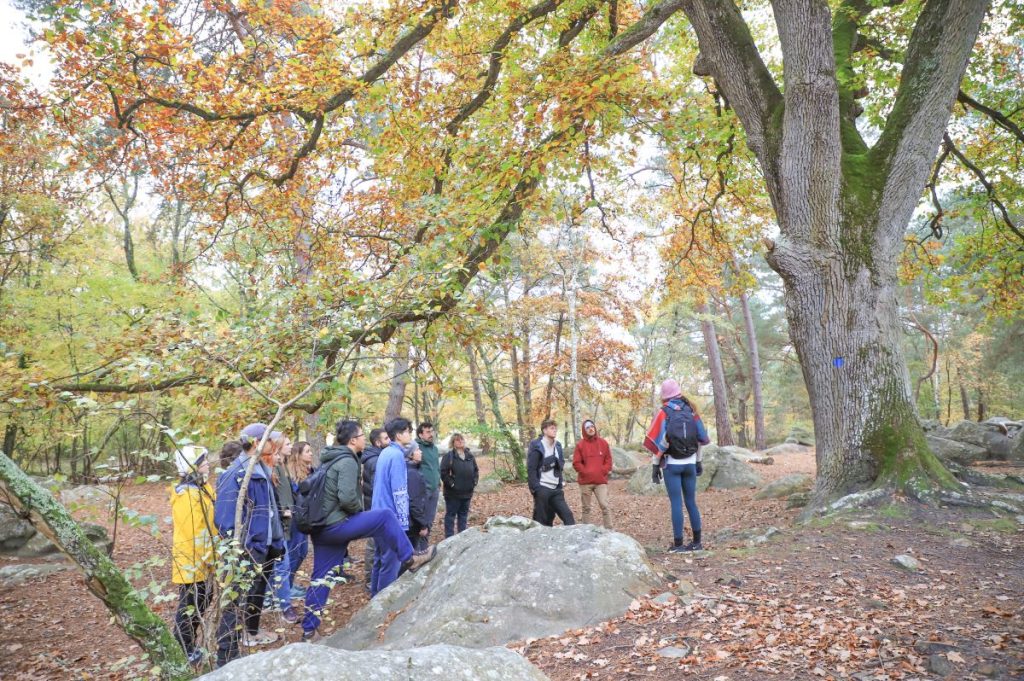Area 3: Pedagogy of Transitions
This research aims to develop knowledge, methods, models, and tools to support both academics and professionals, particularly involved in education and training, in designing effective and relevant pedagogical responses to the challenges of the sustainability transition. Special emphasis is placed on planetary boundaries and systemic thinking across ecological, sociological, industrial, and territorial dimensions.

Area 3
Pedagogy of Transitions
Today, all sectors are impacted by the challenges of ecological transition and the need to transform current professional practices. New and essential skills have to be integrated into the training of (future) professionals, whether in initial education or continuing professional development.
How training individuals for uncertain and rapidly changing environments, to foster resilience, to combine together technical, scientific, and human aspects through a holistic approach, and cultivate creativity ?
What pedagogy to develop these essential competencies ?
Building on proven expertise, ISIGE has launched a research program aimed at drawing lessons from past experiences and aligning them with the evolving needs of tomorrow’s professionals.
Our expertise
Our expertise is built on a methodology that blends hands-on analysis through pedagogical experimentation (fablab, workshop, field trip…) with a systemic organization of insights, enriched by foresight techniques, and prospective analysis, to anticipate global transformations.
This work, which bridges theory and practice, makes it possible to :
- Identify the skills needed to prepare individuals—through education and training—to support ecological transitions, and to understand the process that leads from awareness of environmental emergencies to cooperative, transformative action;
- Design and test new pedagogical approaches that enable the development of these skills;
- Support professors and lecturers in integrating these issues into training programs through a rigorous and tested conceptual framework;
- Help (future) managers in companies and other organizations to implement resilient strategies and solutions in response to global change.
Les projets de recherche
|
Projets |
Périodes |
Partenaires |
Financeurs |
|
Apprendre à transformer “Future Forward” summit on Sustainable Higher Education Octobre 2018 Brussels |
2017-2019 |
Univ Libre de Bruxelles, Cartodebat |
Ressources propres |
|
F-EC Former à l’économie circulaire |
2018-2026 |
FabLab |
ecosystem |
|
Urgences environnementales : processus de transformation des émotions en mobilisation collective Terrain : École des Mines |
2022-2026 |
AFS , CSI , Réseau Ingenium , Réseau Epsi |
Ressources propres Presses des Mines |
Publications
- Schwartz, C. (December 2024). Workshop 7: Skills in the Anthropocene – Facing Environmental Emergencies Through Emotional Metabolization and Multi-Stakeholder Engagement in an Academic Ecosystem: The Case of École des Mines de Paris. Conference: Engineering & the Anthropocene? New Challenges, New Pathways in the Humanities and Social Sciences, International Conference organized by the Ingenium Network, in collaboration with EPSI and OFC, CNAM, Paris, December 12, 2024.
- Schwartz, C., Bouzin, A. (July 2023). Engineering Students at École des Mines de Paris Facing Ecological Challenges. 10th Congress of the French Sociological Association (AFS), “Intersections, Circulations,” Thematic Session: Francophone Contributions to Engineering Studies, French Sociological Association; Max Weber Center; Université Lumière Lyon 2, Lyon, France.
- Oosterbaan, J. (2018–2024). Progress Reports: “Building Skills for the Circular Economy Through Training”, collaboration with ecosystem (confidential).
- Descamps-Large, C., Lyons, E., Fougeirol, D., & Oosterbaan, J. (2020). International River Case Studies as a Means to Develop Awareness and Decision-Making Skills in Multi-Stakeholder Contexts. 6th International Symposium on Knowledge and Capacity for the Water Sector, Delft, Netherlands, May 2020.
- Oosterbaan, J. (2020). Teaching Sustainability: What Is There to Learn and How to Learn It? British Council Meeting – Reaching the Sustainable Development Goals: Universities and Students Looking for Solutions, June 5, 2020.
- Hugé, J., Descamps-Large, C., & Oosterbaan, J. (2018). Teaching & Researching the Planetary Boundaries: How to Move Beyond the Gridlock? Future Forward Conference, Brussels, Belgium, October 2018.
- ISIGE (2018). Can We Learn to Change the World? Reflection Day, Mines Paris–PSL, June 26, 2018.

